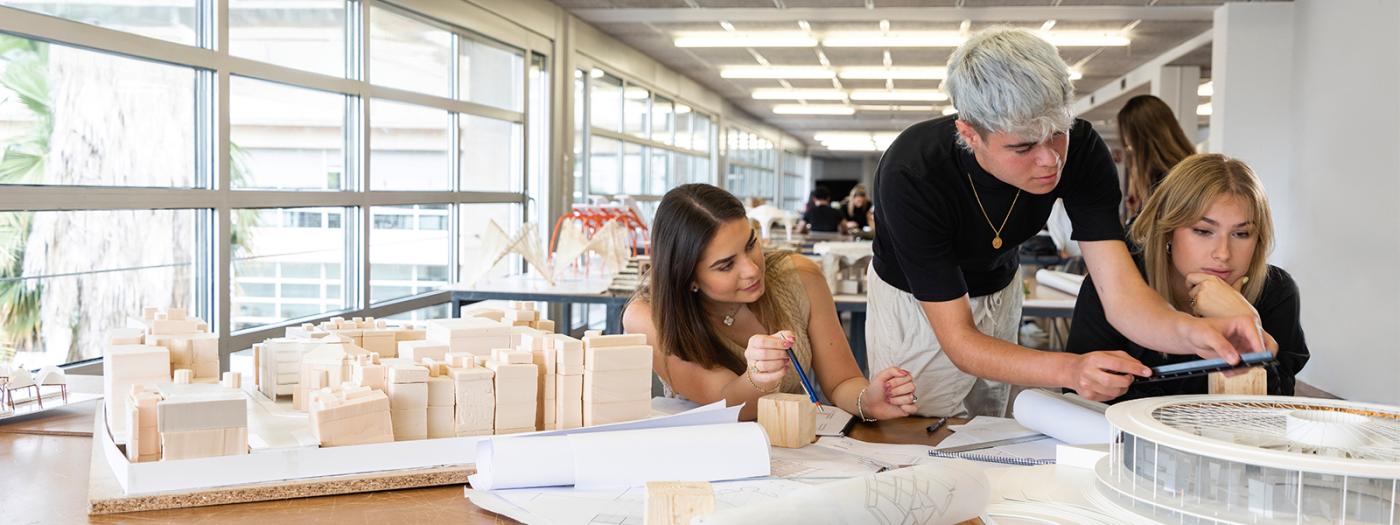Titular Professors
The student must be enrolled in the third, fourth or fifth year project subject.
Throughout the academic period, the student must enrich their knowledge and skills in the development of their architectural models. In this way, I would have to know and master the traditional work techniques that allow him to use his models as a communication system. Thus, it must know how to transmit messages of a conceptual nature (idea, intention, information, experiences, ...) or of a more pragmatic nature (facades, interiors, volumetries, ...).
On the other hand you must learn to choose and combine factors to develop a model according to your project (materials, scales, colors, textures, ...), and thus master the model for its function.
Likewise, the student must understand the model as a tool that allows him to verify throughout the process those points of interest in which he is working. Thus, it will have to develop quick, clear and decisive models that allow it to project and make decisions.
Objectives collected in R.D .:
1. Ability to create architectural projects that satisfy the aesthetic and technical demands.
8. Understanding the problems of structural design, construction and engineering linked to building projects.
The subject of Maquet Workshop is proposed by the need for learning, cultivation and assimilation by the student, of the realization of physical architectural models. In her it is proposed to work, always on projects of the own student, the different scales of a project, and with it the practice of specific techniques on diverse materials. The scale, the intention of the project, the degree of abstraction, the communication and the project process will be worked on.
General competitions
Instrumental:
IS1_Capacity to analyze and synthesize conceptual frameworks generating new knowledge.
IS2_Capacity to organize and plan the application of new knowledge.
IS9_Resolution of architectural problems
IS10_Taking decisions in projects, construction systems, organization, ...
Interpersonal
IT2- Ability to work as a team.
IT4- Ability to work in an interdisciplinary team.
Systemic interpersonal
CS1- Ability to apply knowledge to practice.
CS4- Ability to readjust to new situations.
CS8- Ability to work autonomously.
CS9-Ability to design and manage projects.
CS10-Ability to acquire initiative and entrepreneurial spirit.
CS11- Ability to worry about quality and continuous improvement (in presentations and corrections).
CS12- Ability to reach new challenges (in the capacity to incorporate new solutions and working methods).
Specific competences
A-SKILLS
A28-TECHNICAL PROJECT ANALYSIS. Aptitude or ability to prepare feasibility studies and exercise the supervision, control and coordination of integrated building projects and urban sets and spaces.
B- KNOWLEDGE
B6- GRAPHICAL RESTITUTION. Understanding or knowledge of measurement techniques and graphical survey of buildings and urban and natural areas in all its phases from the drawing of notes to scientific restitution.
B17- MORPHOLOGY AND REPRESENTATION OF THE GROUND. Understanding or knowledge of the topography, hypsometry and cartography bases and the ground modification techniques required to carry out studies and projects of a territorial, urban and landscape nature and to practice demarcation and subdivision.
The student learns by practicing during the realization of models corresponding to their projects. The rhythm of the subject will go hand in hand with the requests of the subject of projects that the student is studying.
The class has a workshop format with a maximum of 24 students, where, with a minimum theoretical load, we will learn from the practice, having to work in the teaching hours and at home.
Dedication to the subject 3 ECTS credits at 26 hours / credit = 78 hours
Semester dedication 19 weeks (17 lectures + 2 exams)
Weekly dedication 4 hours / week
34 teaching hours
8_Theory
26_Practices
34 hours student work (individual and group)
0_Development of supervised project
34_No tutelary
Total hours dedicated to the margin of the exams 68
Presentation preparation hours 10
Total biannual dedication 78
The evaluation of the student's work will be carried out continuously based on the ability to understand and respond to the needs of your project, the ability to define how to guide the work, and the development of it.
The personal involvement and the presentation of the project are valued.
The evaluation of the acquisition of competences will be carried out by means of:
A-SKILLS
A28. Reports.
B-KNOWLEDGE
B6 Reports.
B17 Reports.
